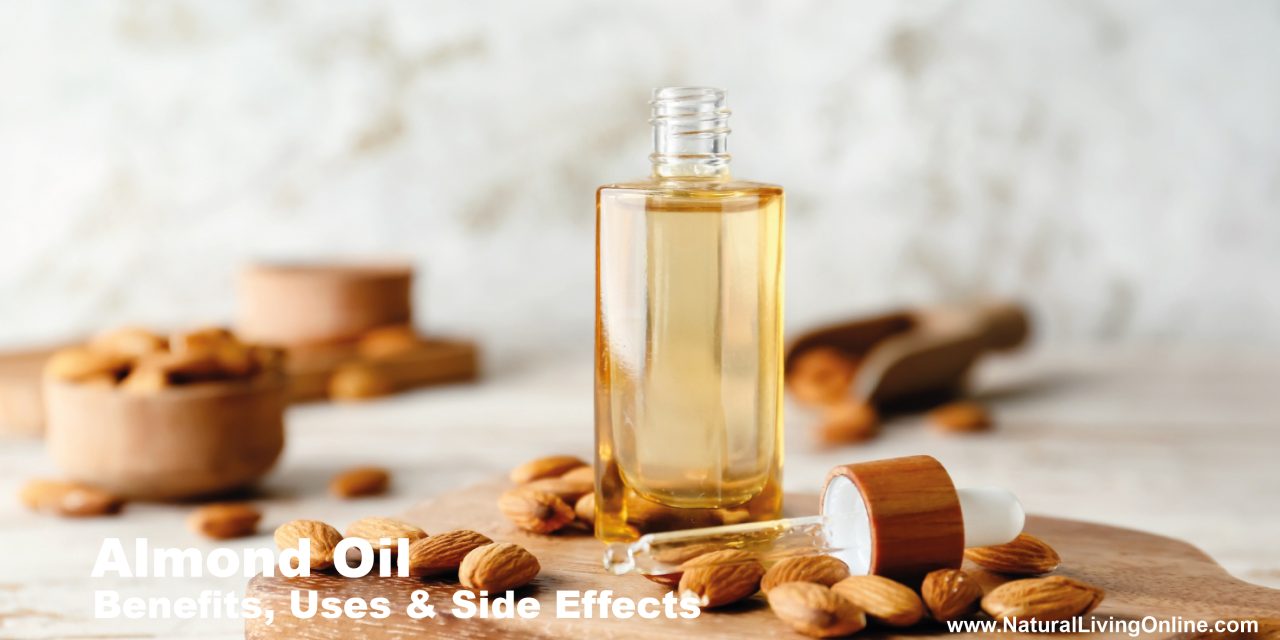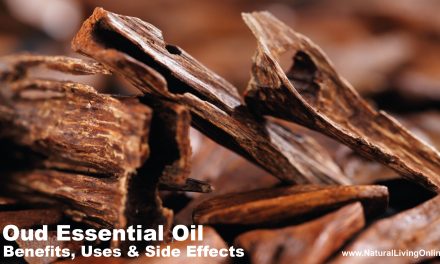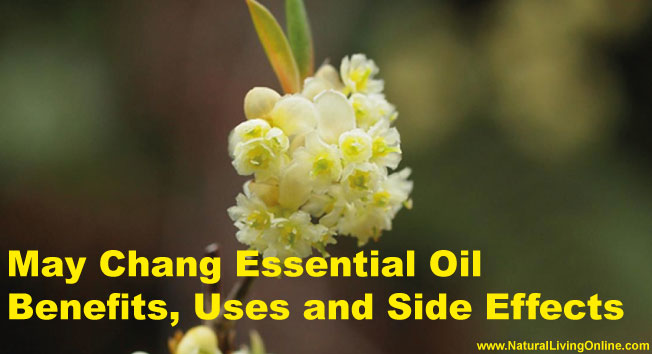Almond oil is a versatile and nutritious oil derived from almonds. Available in two main types—bitter and sweet—the oil is used for a range of purposes, from cooking to skincare. Bitter almond oil is typically used for its scent and flavor in certain recipes and aromatic products, while sweet almond oil is widely celebrated for its health and beauty benefits. Sweet almond oil is particularly known for its high concentration of vitamin E, essential fatty acids, and magnesium, which contribute to its hydrating and nourishing properties.
The benefits of almond oil are extensive. As a skin moisturizer, it helps in preventing water loss and can be used to soften and smooth the skin. Its application on hair can lead to a reduction in frizz and a boost in shine. Additionally, some individuals utilize almond oil as a massage oil due to its emollient properties, aiding in relaxation and muscle stress relief. However, while almond oil is generally safe for topical use and consumption, it is crucial to be aware of potential side effects. Those with nut allergies should avoid almond oil, and it should be noted that unprocessed bitter almond oil may contain harmful substances.

Key Takeaways
- Almond oil serves various functions, from dietary enhancements to skincare applications.
- The oil provides significant health benefits due to its rich nutrient content.
- Awareness of potential allergic reactions to almond oil is important for safe use.
Almond Oil Profile
Botanical Name: Prunus dulcis
Family: Rosaceae
Common Names: Sweet almond oil, Almond kernel oil
Plant Description: The almond tree is a deciduous tree native to the Middle East and South Asia. It can grow up to 10 meters (33 feet) tall and has pale pink to white flowers. The fruit of the tree is a drupe, with the outer hull and a hard shell containing the edible seed (nut), which is used to produce almond oil.
Oil Description: Almond oil is extracted from the seeds (nuts) of the sweet almond tree. It is pale yellow in color with a light, nutty aroma. There are two types of almond oil: sweet almond oil, which is commonly used in cosmetics and culinary applications, and bitter almond oil, which is used for its scent and medicinal properties but is not safe for ingestion.
Extraction Method: The oil is typically extracted through cold pressing, which preserves its nutritional and therapeutic properties. Solvent extraction is also used but is less common for high-quality oils.
Chemical Composition

Almond oil is rich in monounsaturated fatty acids, vitamins, and minerals. The key components include:
- Oleic acid (about 62%)
- Linoleic acid (about 29%)
- Palmitic acid (about 9%)
- Stearic acid (about 2%) Additionally, it contains vitamins A, B1, B2, B6, D, and E, as well as minerals such as magnesium and calcium.
Properties
- Emollient: Deeply moisturizes and nourishes the skin, making it soft and supple.
- Anti-inflammatory: Reduces inflammation and soothes irritated skin.
- Antioxidant: Protects the skin from free radical damage and environmental stressors.
- Regenerative: Promotes skin cell regeneration and healing.
- Non-comedogenic: Does not clog pores, making it suitable for all skin types.
Uses
Skin Care:
- Moisturizer: Used in creams, lotions, and serums to hydrate and soften the skin.
- Anti-aging: Reduces the appearance of fine lines and wrinkles and improves skin elasticity.
- Dark Circles: Helps reduce dark circles and puffiness around the eyes.
- Skin Tone: Improves complexion and skin tone.
Hair Care:
- Conditioner: Hydrates and nourishes hair, making it shiny and smooth.
- Scalp Treatment: Soothes dry, flaky scalp and helps with dandruff.
- Hair Strength: Strengthens hair and reduces breakage.
Body Care:
- Massage Oil: Used for its light texture and skin-nourishing properties.
- Bath Oil: Added to bath water to hydrate and soften the skin.
- Carrier Oil: Commonly used as a base oil for essential oils in aromatherapy.
Culinary Uses
- Cooking Oil: Used for low-heat cooking and baking due to its mild flavor.
- Salad Dressings: Adds a light, nutty flavor to salads and dressings.
- Nutritional Supplement: Consumed for its health benefits, including improved heart health and reduced inflammation.
Understanding Almond Oil
Almond oil, a versatile and nutrient-rich liquid, is extracted from almonds and comes in various forms, offering a range of benefits due to its nutritional composition.
Types of Almond Oil
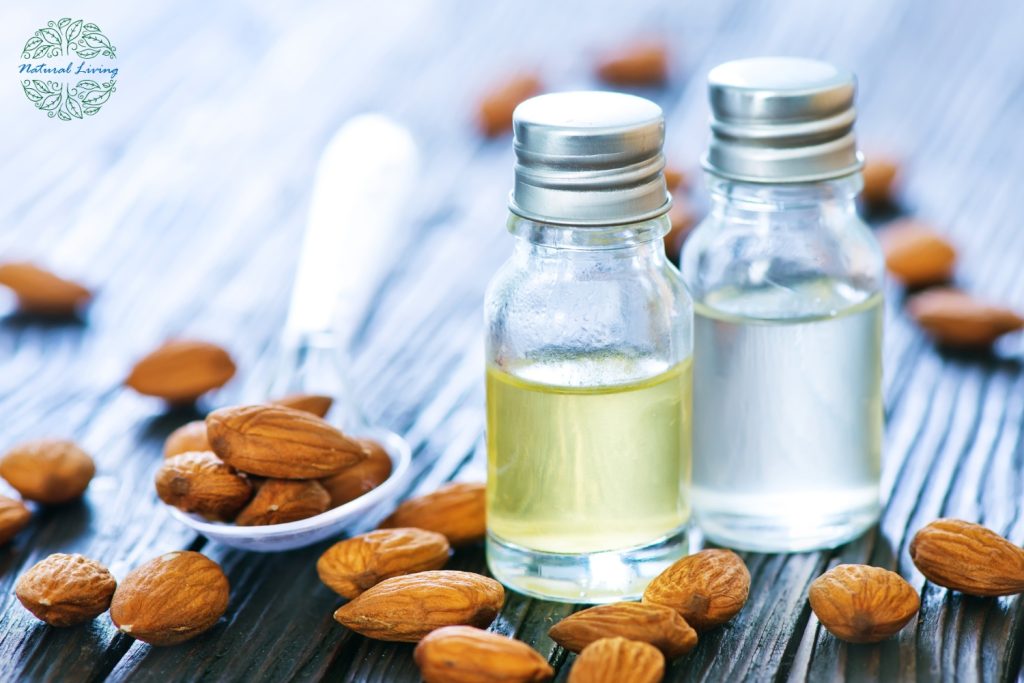
Almond oil primarily comes in two types: sweet almond oil and bitter almond oil. Sweet almond oil is derived from the edible almonds that we commonly consume. It is widely recognized for its cosmetic benefits and is safe for topical use or consumption. On the other hand, bitter almond oil is extracted from the almond tree’s bitter variant. It contains amygdalin, which can transform into toxic cyanide, hence, it’s typically refined and used for its scent in aromatherapy and cosmetics, not for ingestion.
Extraction Methods
The extraction of almond oil can be performed using two main methods: cold-pressing and heat-processing. The cold-pressed approach maintains the nutritional integrity of the oil, extracting it without the use of heat which helps preserve the oil’s full flavor, and nutritional content, leading to what is often labeled as “unrefined almond oil”. Heat-processed almond oil involves higher temperatures, which can strip away some nutrients, resulting in “refined almond oil”, which has a higher smoke point suitable for cooking.
Nutritional Profile
Almond oil’s nutritional profile is rich in monounsaturated fats, particularly oleic acid, and modest amounts of polyunsaturated fats. It contains low levels of saturated fat. One tablespoon of almond oil offers a significant amount of vitamin E, an antioxidant that supports skin health. The oil also contains phytosterols and other potentially beneficial compounds like vitamins and minerals. However, the specific nutrient composition may vary slightly based on whether the almond oil is refined or unrefined.
Almond Oil Benefits
Almond oil, recognized for its numerous benefits, stands out for its moisturizing properties and nutrient-rich composition. It is not only abundant in vitamin E and fatty acids, but also operates as an emollient and antioxidant.
Key Benefits
- Rich in healthy fats, vitamins, and antioxidants.
- Suitable for all skin types, including sensitive and mature skin.
- Light and non-greasy texture, easily absorbed by the skin.
- High nutritional value makes it beneficial for both skincare and dietary uses.
Skin Care Advantages
Almond oil is highly regarded for its contribution to skin health. Its emollient properties enable it to effectively retain moisture, enhancing skin hydration and softness. The oil’s vitamin E content acts as an antioxidant that helps protect the skin from damaging free radicals.
- Hydrating: As a natural moisturizer, it can soothe dry skin.
- Softening: Helps in improving skin texture and tone.
Hair and Scalp Nourishment
Regarding hair and scalp health, almond oil provides substantial nourishment. The fatty acids assist in softening hair, while vitamin E supports a healthy scalp.
- Strengthens Hair: Almonds’ nutrients promote strong, healthier-looking hair.
- Scalp Moisture: Helps prevent scalp dryness and flakes.
Health Benefits
Almond oil offers a variety of health benefits as well. It contains monounsaturated fatty acids that contribute to maintaining healthy cholesterol levels, potentially reducing the risk of heart disease.
- Heart Health: The presence of fatty acids may improve cardiovascular health.
- Antioxidant-Rich: Almond oil is filled with antioxidants, aiding in the protection against oxidative stress.
Practical Uses of Almond Oil
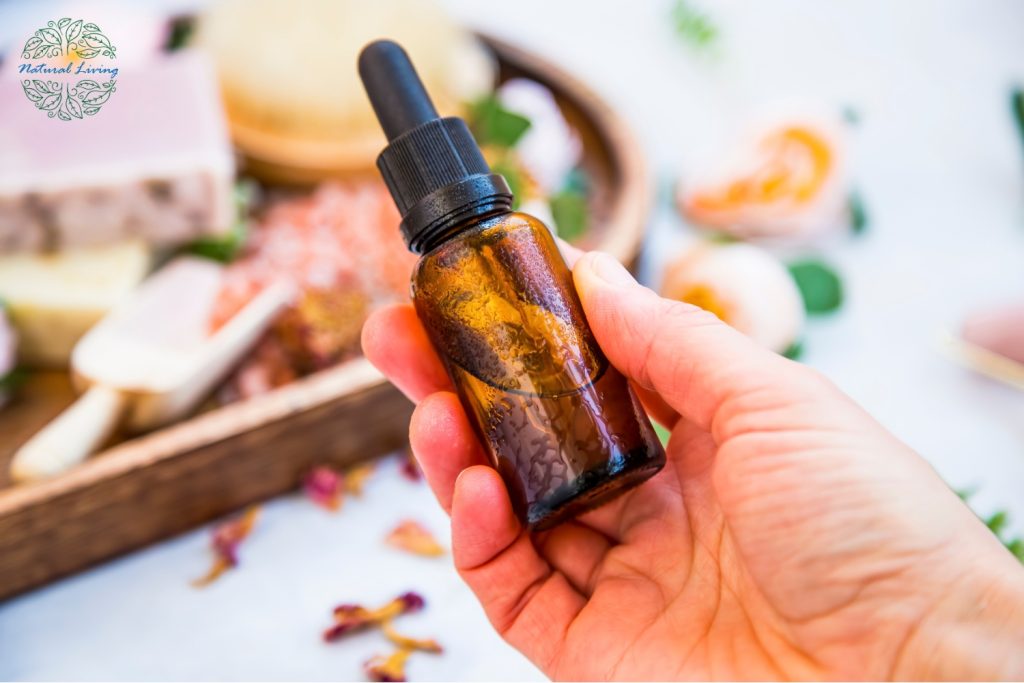
Almond oil is a versatile substance known for its applications in improving skin quality, enhancing culinary dishes, and providing therapeutic benefits. Extracted from the kernels of almonds, this multifaceted oil plays a significant role in diverse domains.
In Beauty Routines
Almond oil’s popularity in beauty routines is due to its emollient properties, which help moisturize and soften the skin. It is often used as a cleanser or makeup remover due to its gentle yet effective nature. Here are some specific uses:
- Skin Care: Regular application can improve complexion and maintain skin hydration. It may also reduce the appearance of stretch marks and sun damage.
- Hair Care: When applied to the scalp and hair, almond oil acts as a conditioning agent that combats dry skin and keeps hair smooth.
Culinary Applications
In the kitchen, almond oil not only adds a pleasant flavor but also offers health benefits when used as a spread or salad dressing. Its high smoke point makes it ideal for certain types of cooking:
- Finishing Oil: Drizzle it over dishes for a nutty flavor.
- Cooking: Use it as a healthier alternative for baking or sautéing.
Therapeutic and Aromatherapy Uses
Almond oil is also a well-regarded carrier oil in aromatherapy and massage. It is compatible with many essential oils and enhances their therapeutic effects. The uses include:
- Massage Oil: Soothes muscles and potentially helps alleviate skin conditions like eczema and psoriasis due to its moisturizing effect.
- Aromatherapy: Serves as a carrier oil for essential oils, delivering benefits such as stress relief and improved mental clarity.
Managing Side Effects and Allergy Information
Before incorporating almond oil into your skincare or dietary routine, it’s essential to understand the potential side effects and risks associated with its use, particularly for those with sensitive skin or nut allergies. Here’s how to recognize allergic reactions and perform precautionary patch testing.
Recognizing Allergic Reactions
Allergic reactions to almond oil, while not common, can occur, especially in individuals with a nut allergy. Symptoms to look out for include:
- Itching: A tell-tale sign of an allergic reaction is itchiness, particularly on areas of skin where the almond oil was applied.
- Inflammation: Swelling, redness, or tenderness in response to using almond oil could indicate an irritation or allergic reaction.
- Skin Conditions: Those with pre-existing skin conditions should be cautious, as almond oil may exacerbate issues in sensitive skin.
When using almond oil, especially if derived from sweet almonds, monitor for any adverse reactions, especially if you have known allergies.
Precautions and Patch Testing
Due to the risks of allergies and side effects, taking the following precautions is imperative:
Patch Test: Before fully integrating almond oil into your regimen, conduct a patch test to assess skin reactivity.
- Apply a small amount of almond oil to the inner forearm.
- Wait 24-48 hours to observe if any irritation or itchiness develops.
Bitter Almonds: Avoid oils made from bitter almonds as they may contain toxins and are not safe for topical or internal use.
Consultation: It’s always wise to consult with a healthcare provider before using almond oil if you have a known allergy.
Integrating Almond Oil into Your Routine
Almond oil, derived from the seeds of the Prunus dulcis tree, comes in two main types: sweet and bitter. Sweet almond oil is widely used for its skin and hair benefits, while bitter almond oil is used for its scent in aromatherapy and cosmetics. When incorporating almond oil into your daily routine, it is essential to understand the best practices and dietary tips to maximize its effectiveness as a natural moisturizer and health supplement.
Best Practices for Skin and Hair Care
Sweet almond oil is a popular emollient known for its ability to soothe and hydrate the skin. For best results:
- Skin: Apply a few drops of sweet almond oil to the face or body after showering, gently massaging it in to promote absorption and moisturization. It’s non-comedogenic, so it won’t clog pores, making it ideal for all skin types.
- Hair Care: Warm sweet almond oil can be massaged into the scalp to improve blood circulation and used as a hair mask to impart a smooth, shiny finish. Rinse thoroughly after applying to avoid buildup.
The vitamin E in sweet almond oil also helps in the restoration of skin elasticity and can reduce the appearance of scarring and premature aging.
Dietary Tips
Almond oil is also a nutritious addition to one’s diet, rich in monounsaturated and polyunsaturated fats, while low in saturated fats. Incorporation of sweet almond oil into meals can aid in reducing inflammation within the body.
- To reap the benefits, one can use sweet almond oil as a salad dressing or a substitute for other oils in low-temperature cooking, as it can impart a subtle, nutty flavor.
- It’s important to note that bitter almond oil is not safe for ingestion as it contains compounds that can be toxic if consumed.
Remember to opt for cold-pressed, organic sweet almond oil when possible, as it retains more natural nutrients, including magnesium and essential fatty acids, which contribute to overall health. However, those with nut allergies or who are at risk of certain types of cancer should consult a healthcare provider before making it a part of their diet.
Frequently Asked Questions
How can almond oil benefit skin health?
Almond oil is a potent moisturizer due to its emollient properties, which help prevent water loss from the skin. Its richness in vitamin E can also help protect the skin from oxidative stress and UV radiation damage.
What are the hair care benefits of using almond oil?
Using almond oil on hair can smooth frizz and enhance shine due to its moisturizing and strengthening effects. It can also nourish the scalp and reduce the likelihood of dandruff.
Are there any notable side effects associated with using almond oil on the skin?
Most individuals can use almond oil on their skin without adverse effects. However, those with nut allergies should be cautious as it may trigger allergic reactions.
What are the different types of almond oil available and their distinct properties?
There are two primary types of almond oil: sweet and bitter. Sweet almond oil is commonly used for skin and hair care due to its beneficial properties, while bitter almond oil is not recommended for topical use as it might contain toxins.
How might including almond oil in one’s diet be advantageous?
Incorporating almond oil into the diet may support heart health by potentially reducing cholesterol levels. Its content of monounsaturated fats and vitamin E also promotes overall health.
Can almond oil usage lead to changes in skin pigmentation?
Almond oil does not have bleaching properties and thus is not associated with changing skin pigmentation. It can help improve skin tone uniformly by moisturizing and supporting skin health.
References:
This website does not provide medical advice.
All information provided on this website, and on associated social media networks, including but not limited to texts, images, and numbers are for general information purpose only. It is not intended as medical advice and it does not include all possible precautions, side effects, or interactions that may occur. Neither NaturalLivingOnline.com nor its author/founder take responsibility for how you use this information. Statements contained on NaturalLivingOnline.com have not been evaluated by the FDA. You should conduct thorough research via multiple sources and consult your physician or qualified doctor before using any essential oil or herbal remedy. Information on NaturalLivingOnline.com must not be relied upon for medical, legal, financial or other decisions.

